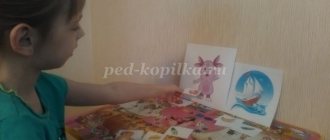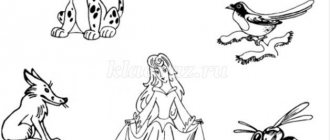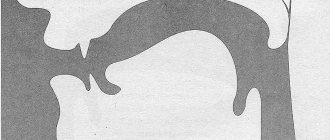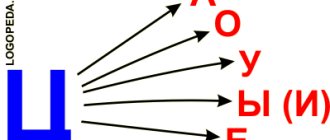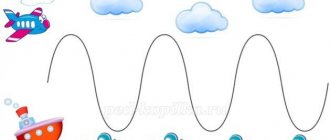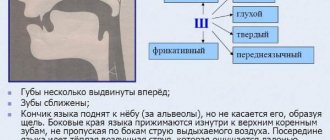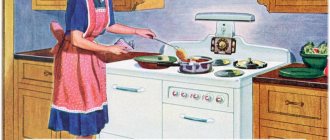We begin automating sounds in words only after the child clearly pronounces an isolated sound and can pronounce it correctly in syllables. We name words, highlighting the automated sound with our voice. We pronounce the words slowly, pronouncing them clearly. It is advisable to repeat the same word 2-3 times.
Articulation of sound [C:
- lips stretched in a smile;
- teeth are closed and exposed (“fence”);
- tip of the tongue behind the lower teeth;
— the air stream is cold (make sure that the air comes out in the middle)
After the correct sound is delivered and fixed in speech in isolation, we move on to repeating syllables and syllable rows.
Preparation of the articulatory apparatus
Doing various speech gymnastics is very important for a child. Examples of articulation exercises that are recommended to be performed in front of a mirror:
- make a fence of teeth and smile;
- blow on soap bubbles, cotton balls, fluff, floating toys in the water;
- whistle into sticks;
- make a “spatula”: the tongue lies in a wide position on the lower lip (hold for a few seconds);
- “tube” exercise: open your mouth and curl your tongue into a tube, then blow into it for a long time.
Disadvantages of pronunciation of the sound [S]
- Interdental sigmatism . When pronouncing the sound [C], the end of the tongue falls between the teeth. This prevents the air stream from escaping. The blown air becomes warm. The resulting sound resembles [T].
- Nasal sigmatism . The tongue goes back, the lips are connected. The air rises to the soft palate and exits through the nose. Often, instead of [C], a similarity to [X] is heard. Here it is important to make sure that the child does not have rhinolalia or rhinophony.
- Lateral sigmatism . The tongue goes to the side. And not just to the side, but one edge of the tongue at the top, the other at the bottom. The distance between the teeth increases. Exhaled air flows from the sides. The sound produced resembles a “squelching”.
- Labial-dental sigmatism. The sound produced resembles [F]. The upper jaw comes forward. It turns out that the lower lip comes into contact with the upper teeth.
- Dental sigmatism . The sound resembles [T]. The end of the tongue simultaneously rests on the upper and lower incisors. As a result, air cannot escape freely.
- Hissing sigmatism . The end of the tongue goes deeper into the oral cavity, the back rises high, and a groove does not form in the middle of the tongue. A “hissing” appears. Reminds me of the sound [Ш] (shabaka).
In the case of parasigmatism, persistent replacements of whistling sounds occur. The softening is not [S], but [S'], also replacing with [T], [F]. Those. the sound does not resemble a certain one, due to incorrect articulation, and the child specifically replaces [C] with another sound.
Sound production technique C
You can make the sound “C” in different ways:
- imitating;
- mechanically;
- with the help of articulatory gymnastics;
- using other sounds.
In order to make the sound “C” by imitation, you need to practice in front of a mirror and show your baby the correct position of the tongue and lips. The child should feel the cool exhaled air while pronouncing a consonant - put his palm to his mouth.
The mechanical method involves the use of auxiliary devices: a probe, a spatula. At home, a mild toothpick or ice cream stick is suitable for use.
Procedure:
- The object must be placed along the tongue, fixing its correct position for pronunciation.
- The child should smile and place the edge of the tongue on the lower incisors. You need to blow through the resulting gap.
- Pressing the object along the tongue forms a groove along which a stream of air flows. A whistle should be heard.
- The tongue should be hidden behind the teeth, and the teeth should be brought together.
- The child continues to whistle, and the parent (speech therapist) adjusts the pressure, achieving the correct and clear sound pronunciation of “C”.
- As soon as the sound begins to sound clearly, remove the mechanical object.
After several such trainings, the child can independently control his tongue, positioning it correctly in the oral cavity, and whistle.
When setting “C”, you can use other sounds.
- When pronouncing the soft “Сь”, it is necessary to press with a mechanical device on the front part of the tongue to form a groove - the hard sound “C” is pronounced. This option is practiced several times until the tongue learns to lie correctly;
- you need to say “T” for a long time, while smiling, stretching your lips. To make the “C” sound clear, you need to smile wider;
- when the baby pronounces “Sh” correctly, you need to hiss for a long time, while moving your tongue towards the front teeth (the sound “S” will be heard);
- ask the child to pull “I”, then start blowing, releasing a stream of air along the groove that has formed (the tongue is in the same place).
Articulation of sound [C]
The sound [S] is a consonant, deaf, hard, front-lingual. Normally, by the age of four, children have formed the correct pronunciation of whistling sounds.
Articulation of sound [C] The lips are stretched in a wide smile, teeth are visible, between which there is a distance of about 2 mm. The end of the tongue rests on the lower incisors, the back of the tongue takes the “slide” position. A groove is formed in the middle of the tongue, through which a cold stream of air flows. We don't use our voice.
Automation C in syllables
After exercises to train the articulatory apparatus (with regular practice), syllables with the sound “C” are given (repeated 3 times): -sa, -so, -su, -sy, -as, -ys, -os, -us, -is, -es, -es, -yus, -yas.
Then the syllables are combined with each other:
- -sy-sa-so;
- -sa-sy-su;
- -sa-sy-sa;
- -sy-sa-sy;
- -sa-sa-sy-sy.
The exercises are gradually complicated by other consonants:
| SK CM ST JV CH NE | A - ska, sma, sta, spa, sleep, sva |
| U - sku, smu, stu, spu, snu, swo | |
| O - sko, smo, hundred, spo, sno, svo | |
| Y - skis, smas, sts, spas, dreams, svy | |
| And - ski, media, sti, sleep, sleep, swee |
Sound automation [C]
- Speech therapist.No
- Automation of sounds
- Automation of sound C
Audio automation exercises [C]. C__ - long pronunciation of the sound [C].
1) Pronounce (read) the syllables S__A, S__O, S__U, S__Y, S__E
The sound [S] is pronounced for a long time
2) Pronounce (read) words with the sound [C] at the beginning
Sample: s-oh
|
|
|
|
3) Pronounce (read) words with the sound [C] in the middle
Sample: kos-a
|
|
|
|
4) Pronounce (read) the syllables AC__, OS__, US__, YS__, ES__, IS__, ES__, YS__, YS__, YS__
The sound [S] is pronounced for a long time
5) Pronounce (read) words with the sound [C] at the end
Sample: us__.
|
|
|
|
6) Pronounce (read) words with a combination of consonants with the sound [C] in the middle
Sample: dis__k.
|
|
|
|
|
7) Pronounce (read) words with a combination of consonants with the sound [C] at the beginning
Sample: с__lon.
|
|
|
|
 Pronounce (read) phrases
Pronounce (read) phrases
- Salted butter.
- Salted cabbage.
- Sweet watermelon.
- Sweet and sour kvass.
- Ripe apricot.
- Radish salad.
- Sausage with garlic.
- Bowl of rice.
- Tall birch tree.
- Dense forests.
- Empty barn.
- Motley dog.
- Old suit.
- Narrow boots.
- Clean dishes.
- Tasty soup.
- Sonya is tired.
- Glory in the bushes.
- Sanya fell asleep.
- Larisa has a stroller.
- Rash the sand, Nastya.
9) Conjugate sentences
- I cut down a pine tree.
- I put the soup on the table.
- I ate a glass of sour cream.
- I broke a branch from a bush.
Sample:
- I slept on the sofa.
- You slept on the sofa.
- He (she) slept on the sofa.
- We slept on the sofa.
- You slept on the sofa.
- They slept on the sofa.
10) Say (read) sentences
Sample: S_they have a smart mind.
- There is a fox in the forest.
- A wasp sits on the sedge.
- There are dishes on the shelf.
- There are tall pines in the forest.
- Stas has blond hair.
- Carry the sand with a shovel.
- Dogs don't bite their own.
- I fell from the sled into the bushes.
- There are staunch soldiers on the desk.
- The ship stopped at a rock.
- The plane flies high above the forest.
- The dog sees an owl on the bitch and barks.
- Sedge dries in the sun.
- Bring dry straw for the donkey.
- There are sweet plums in the garden.
- It's damp outside, put on your boots.
- Sonya, look - catfish!
- The catfish has a mustache.
- In the buffet there is cod, sugar, cheese, lard.
- Sonya brushed the salt off the table.
- Stas eats sausage with garlic.
- The moose broke a pine branch.
- Your kvass is delicious.
- Slava ate the whole pineapple.
- Someone squeaked in the bushes.
11) Pronounce (read) tongue twisters
- Sonya and Sanya have a catfish with a mustache in their nets.
- Haymaking, haymaking, meadow was left without hair.
- A well-fed elephant sleeps peacefully, enjoying its hundredth dream.
- Fall, snow, snow, sprinkle everyone, everyone!
- Elephants are calm and strong.
- I bring soup, soup, and to whom, to the dog, to the dog.
- Little Sanya's sleigh moves on its own.
- Slava ate lard, but there was not enough lard.
- Gander after gander stomp in single file, gander looks down on gander.
- Osa is barefoot and without a belt.
12) Pronounce (read) and retell the text
In the forest
Sanya and Slava were in a pine forest. There was a dog with them. The forest is damp and there is little sun. The dog saw a magpie on the bitch. The magpie saw the dog and flew away. Sanya saw a hedgehog under the pine tree. Sanya failed to catch him. Slava stood up and began to look up. An airplane was flying over the forest. The plane scared the fox. A fox ran past the boys into a hole. Then Sanya and Slava turned home. At the edge of the forest, grass was drying in stacks. The guys rested by the haystack. Soon they were home.
13) Say (read) poems
Sledging
Sanya and Sonya are riding on a sled, pushing the sled. Sleigh jumps, Sanya hits the side, Sonya crashes into a snowdrift.
Ganders
They walk along the line, gander after gander. The gander looks down on the gander. Oh, the Gusak will pluck the gander's sides.
14) Pronounce (read) and memorize a poem
Dream
Sonya, Sanya, the dog and the cat are sleeping peacefully, the catfish with its mustache is falling asleep, the owls are sleeping on the bough.
Automation C at the beginning of a word
The adult says and the child repeats the following words:
- Savva, kindergarten, saga, barn, glanders, soot, saury, lard, centimeter, carp, satin, orderly, net, plane, sundress, most, Sasha.
- Full, son, sprinkle, son, rash, cheese, cheese.
- Advice, juice, essay, neighbor, dream, honeycomb, variety, owl, soloist, Sofia, salt, soldier.
- Joint, soup, land, court, sultan, judge, dryness, cloth, cracker, marmot, sum, souvenir, bag, supermerket, Saturday.
- Sit down, sister, gray, seven, second, Seva, village, saddle, Seryozha.
- Symbol, sieve, bruise, lilac, syrup, strength.
The words become more complex (there are other consonants next to the “S” sound): I’ll reduce, I’ll cook, my own, country, stop, jump, go down, follow, rolling pin, senior, boring, savvy, urgent, back, sleep, average, bullfinch, cream, snow, tears, sing, Sveta, descent, whistle, pig, laughter, sour cream, brave, change, trace, saliva, wash off, crumpled, dispute, calm, slope, shooter, how much, sell, syllable, puff pastry, rumor.
Automation C in sentences
To practice pure pronunciation, the child should repeat the sentences. This exercise is considered difficult.
- The soup is carried in a bowl.
- They brought pine from the forest.
- A lumberjack cut down a pine tree.
- An owl sleeps at the very top of the pine tree.
- Sasha’s parents will buy new dishes on Saturday.
- Lucy was painting a plane.
- A branch has dried up on the tree.
- There is a pike perch in the bag.
- Catfish have whiskers.
- Sasha bought scales.
- Aunt Sonya brought new beads.
- Sveta has a beautiful headscarf.
- Our gas went out again. And you?
- Who's carrying the tray?
- Lucy buys a pineapple.
- The sailor raises the sail.
- Nastya loves iris.
- We brought the cat food and called her: “Kitty-kitty.”
- Kostya and Seryozha go into the forest.
- A chair was placed at the table.
- Storks were sitting in the bushes.
- Nastya came backstage wearing a dog mask.
- We will have many guests today.
- Styopa loves to blow the whistle.
- Today we noticed tracks of a moose and a fox in the snow.
Poems with sound C
Vacuum cleaner
I will help my mother - use a vacuum cleaner to remove dust from the floor, from the rug, from the sofa... I will not get tired of vacuuming. Suddenly the dog Barbos barked: “Woof, woof, woof, let go of my tail!”
Dishes
Glass glass, frying pan, saucepan,
A dinner set, a beautiful tray, a salt shaker, an oil dish - all this is tableware. And a bowl of soup that Barbos likes. The dog eats the soup and wags his tail, and after dinner he plays with the bowl.
Sonya loves to sleep very much. They started calling Sonya Sonya. Sonya – Sonya sleeps all day. She's too lazy to even go for a walk. Look, Sonyushka, there’s sunshine outside!
A gander and a gander are walking along the line. The gander looks down on the gander. Oh, the gander will pluck the gander's sides!
Sana, Sonya and Yegorka had fun on the slide, but Marusya didn’t ride, she was afraid to fall into the snow.
Two tits flew to a pine tree. Two sisters whistled about spring. How much light! How much light!
The altitude has become blue, Summer is coming! Summer is coming soon! Beauty! Beauty!
A fox walked along the path and carried mushrooms in a basket. Five honey mushrooms and five chanterelles, For the little foxes and for the chanterelles. Who doesn't believe is him. Get out of the circle!
Ripe plums are hanging. The plum orchard turned blue. Plums on the left, plums on the right. Slava collects plums.
The catfish has a dream about
That he is a strong elephant, not a catfish.
-Where is the mustache? - the catfish is alarmed.
I don't agree with the dream.
Slava ate cabbage salad. The cabbage salad was delicious.
Snow is falling, falling from the sky. The winter forest sleeps under the snow. The sleepy garden stands in the snow, He also sleeps under the snow.
The dog Barbos is completely limp,
I'll eat
Iris "Kitty-Kitty".
And on the same pine branch, two icicles - pendants are visible. Two icicles hang from a pine tree, Two icicles are afraid of spring. Fidget Vasenka Doesn't sit still. Fidget Vasenka is with us everywhere. Vasenka has a mustache, There is gray hair on his mustache. Vasenka has an arched tail and a spot on his back. Once upon a time there were a hundred children, everyone went to kindergarten. Everyone sat down for lunch, everyone ate a hundred cutlets, and then went to bed. Start counting again. A cart was traveling from Moscow and lost three boards. Knock - ringing, Get out! Ahi, ahi, ahi - oh, Baba was sowing peas. He was born thick, We will rush, you wait! One two three four five. The pig went out for a walk, And behind the pig there was a gray wolf. The wolf knows a lot about pigs. One, two, everyone get up, Three, four, squat, Five, six, turn around, Seven, eight, smile, Nine, ten, don’t yawn, take your place. Grandma bought some beads, Grandma tripped over a goose at the market - All the beads were pecked by the geese. Pine The birches and aspen trees are sad, Autumn tears the leaves from the branches. The pine tree has not a tear - The dress is green on her. Whether it’s winter or spring – All green pine! Dachshund Sitting in a taxi The dachshund asked: - What is the fee for travel? And the driver: - We don’t take money from taxes at all, That’s it, sir. March Snow said: “When I flock, There will be a river of doves, It will flow, rocking a flock of Reflected doves.” Material used: T.A. Kulikovskaya “The tongue whistles” N.N. Sozonova, E.V. Kutsina “Poems for fixing sounds”
